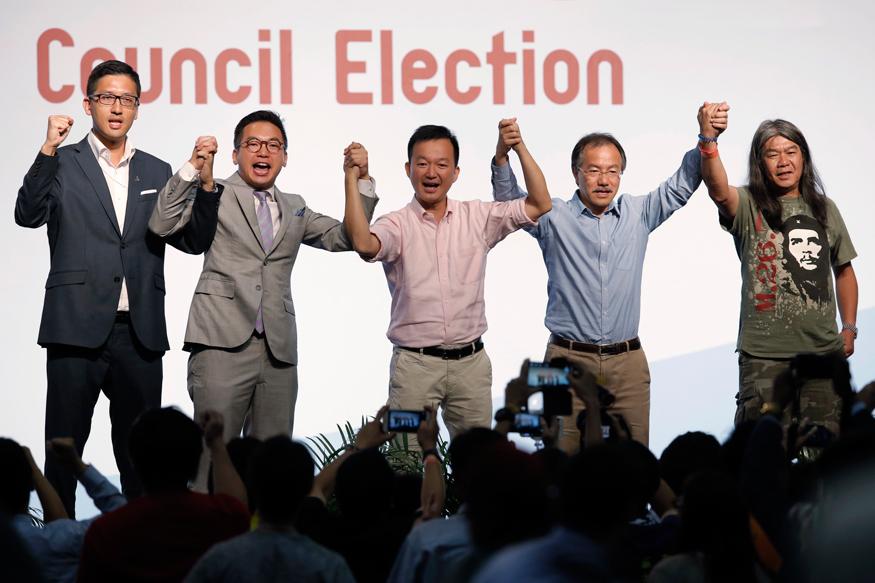-
Tips for becoming a good boxer - November 6, 2020
-
7 expert tips for making your hens night a memorable one - November 6, 2020
-
5 reasons to host your Christmas party on a cruise boat - November 6, 2020
-
What to do when you’re charged with a crime - November 6, 2020
-
Should you get one or multiple dogs? Here’s all you need to know - November 3, 2020
-
A Guide: How to Build Your Very Own Magic Mirror - February 14, 2019
-
Our Top Inspirational Baseball Stars - November 24, 2018
-
Five Tech Tools That Will Help You Turn Your Blog into a Business - November 24, 2018
-
How to Indulge on Vacation without Expanding Your Waist - November 9, 2018
-
5 Strategies for Businesses to Appeal to Today’s Increasingly Mobile-Crazed Customers - November 9, 2018
China warns new Hong Kong lawmakers not to back independence
“Beijing will be very unhappy about the results and it’s quite possible that they may use this as a pretext to squeeze Hong Kong even harder”, he told AFP.
Advertisement
Another surprise was Nathan Law, a student leader in the 2014 protest movement, who also won a seat.
He co-founded the Demosisto Party with well-known activist Joshua Wong and will now become the youngest lawmaker in Hong Kong.
Full results weren’t due till later in the day.
In the biggest polls since the 2014 protests made Law a household name in Hong Kong, the 23-year-old entered the legislature with a convincing victory, gaining more than 50,000 votes.
“I think (Beijing) will be very anxious, I’m representing a new vision of Hong Kong’s future and a brand new force of the resistant camp”, he added, vowing to continue civil disobedience action against Chinese Communist rule.
That represents a break with the established mainstream “pan-democrat” parties, who have demanded voters be able to elect more lawmakers as well as the city’s top leader, or chief executive now chosen by a panel of pro-Beijing elites but never challenged the idea that Hong Kong is part of China.
The biggest gainers, by a mile, is the conglomeration of localists and radicals who scooped up nearly 20 of the popular vote, putting them on a par with what must now be called the old pan-democrats.
A total of six of the 19 seats won by the political opposition went to localist candidates in the direct elections in Hong Kong’s districts, who took almost 20 per cent of the total vote share.
“It can be described as a miracle that I won”, the South China Morning Post quoted Nathan Law Kwun-chung as saying.
Over the past four years, Hong Kong’s political landscape has been radically re-shaped.
It introduced a controversial new form before the LegCo election which required candidates to verify they understood Hong Kong was an “inalienable part of China”. A move by Hong Kong election authorities to bar five candidates from running may have backfired.
The vote is the last before a successor to Chief Executive Leung Chun-ying – who polls have shown as having a low popularity rating – is elected in March for the top post in the former British colony. In the bills’ second reading, the pro-Beijing camp, without the numbers necessary to win the vote, attempted to out-maneuver the opposition by staging a walkout in order to reduce the number of members in the council and force an adjournment on the vote.
In the digital age, young people are more attuned to global trends, such as the need for nations to compete by the attraction of their ideals rather than by force or by simply appealing to material self-interests. Many polling stations remained open well into Monday, hours after the voting officially ended.
The Electoral Affairs Commission said 58 percent of the city’s 3.8 million eligible voters had cast their ballot, up from 53 percent in 2012 and the highest turnout for any legislative election since 1997.
“It shows how Hong Kong people wanted to change”.
“I knew I couldn’t afford to miss it”, first time voter Sophia Cheng, 25, told CNN.
And that could mean less stability for Hong Kong in the days to come. They represent part of society. Post-graduate student Deryck Chan, 25, flew back from the United Kingdom to cast his vote – a journey of 6,000 miles.
Among its policies is even the proposal that Hong Kong must seek independent water and food supplies to reduce dependency on mainland China.
Others, like 28-year-old Jaco Tang, delayed trips overseas to ensure they’d be able to exercise their democratic rights.
These new legislators stand apart from more established and moderate pro-democracy lawmakers who for decades have tried to work with Beijing while pushing for expanded direct elections.
That includes candidate Elizabeth Quat, who said she hoped the incoming legislators prove ineffectual.
Advertisement
Ella Wong, 27, was also studying overseas during the last elections. Some 2.2 million people voted, much more than in past elections, indicating increased polarization and an intense interest in both sides to “send a message”.





























